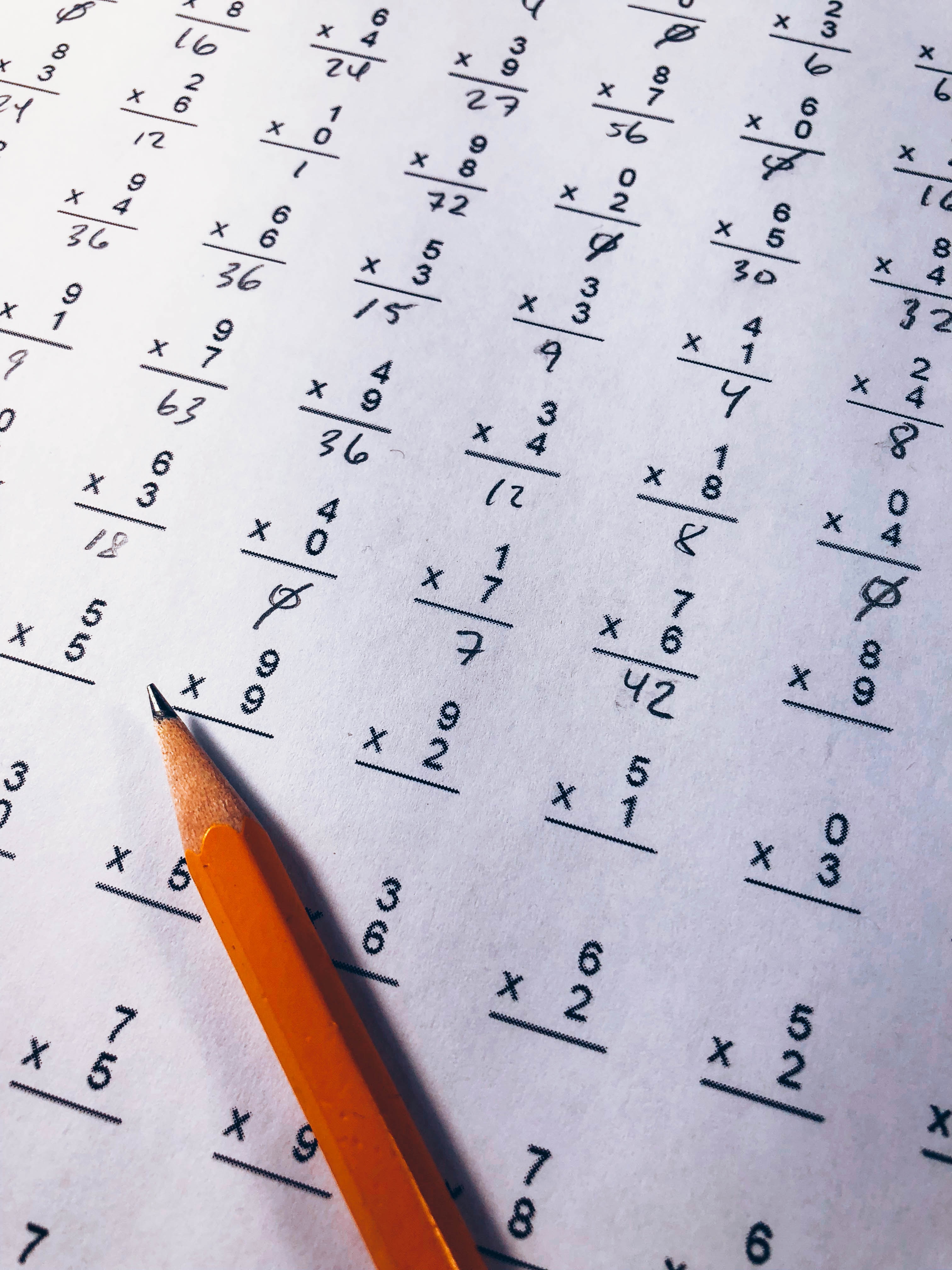Listed below are selected resources related to teaching mathematics.
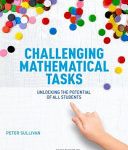 Challenging mathematical tasks: Unlocking the potential of all students
Challenging mathematical tasks: Unlocking the potential of all students
by Peter Sullivan
Sullivan’s research shows that many students do not fear challenges in mathematics, but welcome them, and rather than having teachers instruct them, prefer to work out solutions for themselves. This book includes activities that allow for sustained thinking, decision-making and risk-taking by the students, and features a ‘Learning Focus’, ‘Key Mathematical Language’, ‘Pedagogical Considerations’, and ‘Enabling and Extending Prompts’ for each task.
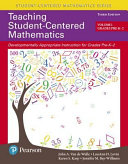 Teaching student-centered mathematics: Developmentally appropriate instruction for grades pre-K – 2
Teaching student-centered mathematics: Developmentally appropriate instruction for grades pre-K – 2
by John A. Van de Walle, LouAnn H. Lovin, Karen S. Karp, and Jennifer M. Bay-Williams
Grades: K-2
Part of the Student-Centered Mathematics Series, this book is designed to illustrate what it means to teach student-centered, problem-based mathematics, to serve as a reference for the mathematics content and research-based instructional strategies suggested for the specific grade levels, and to present a large collection of high quality tasks and activities that can engage students in the mathematics that is important for them to learn.
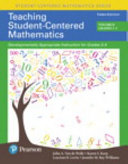 Teaching student-centered mathematics: Developmentally appropriate instruction for grades 3-5
Teaching student-centered mathematics: Developmentally appropriate instruction for grades 3-5
by John A. Van de Walle, Karen S. Karp, LouAnn H. Lovin, and Jennifer M. Bay-Williams.
Grades: 3-5
Part of the Student-Centered Mathematics Series, this book is designed to illustrate what it means to teach student-centered, problem-based mathematics, to serve as a reference for the mathematics content and research-based instructional strategies suggested for the specific grade levels, and to present a large collection of high quality tasks and activities that can engage students in the mathematics that is important for them to learn.
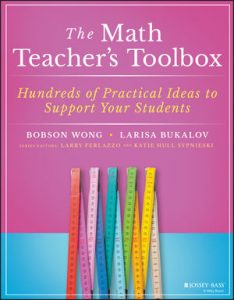 The math teacher’s toolbox: Hundreds of practical ideas to support your students
The math teacher’s toolbox: Hundreds of practical ideas to support your students
by Bobson Wong & Larisa Bukalov
Grades: K-12
The Math Teacher’s Toolbox contains hundreds of student-friendly classroom lessons and teaching strategies….Topics range from the planning of units, lessons, tests, and homework to conducting formative assessments, differentiating instruction, motivating students, dealing with “math anxiety,” and culturally responsive teaching.
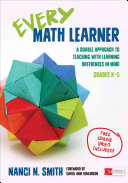 Every math learner: A doable approach to teaching with learning differences in mind, grades K-5
Every math learner: A doable approach to teaching with learning differences in mind, grades K-5
by Nanci N. Smith
Grades: K-5
Smith debunks the myths around what math differentiation is and is not, and offers a practical approach to teaching mathematics for real learning differences.
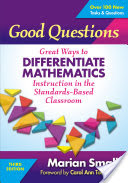 Good questions: Great ways to differentiate mathematics instruction in the standards-based classroom
Good questions: Great ways to differentiate mathematics instruction in the standards-based classroom
by Marian Small
Grades: K-8
This resource helps experienced and novice teachers to effectively and efficiently differentiate mathematics instruction in grades K-8 using two strategies: Open Questions and Parallel Tasks.
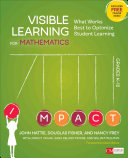 Visible learning for mathematics, grades K-12: What works best to optimize student learning
Visible learning for mathematics, grades K-12: What works best to optimize student learning
by John Hattie, Douglas Fisher, and Nancy Frey
Grades: K-12
The authors discuss three important phases of learning mathematics: the surface learning phase, where students explore new concepts and make connections to procedural skills; the deep learning phase, where students make connections among conceptual ideas and form generalizations; and the transfer phase, when they can independently approach more complex concepts and situations.
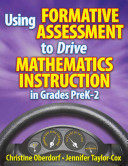 Using formative assessment to drive mathematics instruction in grades preK-2
Using formative assessment to drive mathematics instruction in grades preK-2
by Christine Oberdorf and Jennifer Taylor-Cox
Grades: K-2
The authors illustrate the distinction between a “traditional” assessment and an “enhanced” assessment; describe specific differentiated activities; provide “Questions to Assess” to determine what each child understands about the math concept; show how to move students to higher-level mathematics thinking and to apply math concepts; and share extension activities to offer challenging work for children who have achieved skill mastery level.
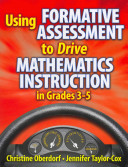 Using formative assessment to drive mathematics instruction in grades 3-5
Using formative assessment to drive mathematics instruction in grades 3-5
by Christine Oberdorf and Jennifer Taylor-Cox
Grades: 3-5
The authors illustrate the distinction between a “traditional” assessment and an “enhanced” assessment; describe specific differentiated activities; provide “Questions to Assess” to determine what each child understands about the math concept; show how to move students to higher-level mathematics thinking and to apply math concepts; and share extension activities to offer challenging work for children who have achieved skill mastery level.
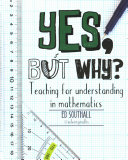 Yes, but why? Teaching for understanding in mathematics
Yes, but why? Teaching for understanding in mathematics
by Ed Southall
Grades: K-12
Getting the right answers in math is only half the problem; understanding why the processes work is the part that often stumps students and teachers alike. This book answers a range of questions about why mathematics works, and sheds light on the hidden connections between everything in mathematics at school.
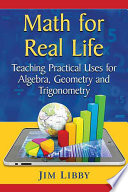 Math for real life: Teaching practical uses for algebra, geometry and trigonometry
Math for real life: Teaching practical uses for algebra, geometry and trigonometry
by Jim Libby
Grades: 7-12
This book presents hundreds of practical applications for mathematics—from baseball statistics to the theory of relativity—that can be understood by anyone with a knowledge of high school algebra, geometry and trigonometry. It will help teachers to answer the inevitable question “When are we ever going to use this?”
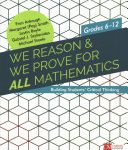 We reason & we prove for ALL mathematics: Building students’ critical thinking, grades 6-12
We reason & we prove for ALL mathematics: Building students’ critical thinking, grades 6-12
by Fran Arbaugh et al.
Grades: 6-12
This book spans all mathematical content areas to provide teachers with strategies to help build students’ reasoning and proving skills. Activities include solving and discussing high-level mathematical tasks; analyzing narrative cases that make the relationship between teaching and learning salient; examining and interpreting student work; and modifying curriculum materials and evaluating learning environments to better support students.
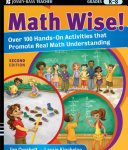 Math wise! Over 100 hands-on activities that promote real math understanding, grades K-8
Math wise! Over 100 hands-on activities that promote real math understanding, grades K-8
by Jim Overholt and Laurie Kincheloe
Grades: K-8
This activity book is a resource teachers can use to give students a firm grounding to work with more advanced math concepts. Contains over 100 activities that address topics like number sense, geometry, computation, problem-solving, and logical thinking. Activities are presented in order of difficulty and address different learning styles
Finding More Resources
To find more resources in this area, try the following:
- Search using the General tab on the UBC Library website to look for material in all UBC Library branches.
- Search using “Search Education Resources” box in the left hand bar on the Education Library website to limit your results to physical materials in the Education Library.
- Use specific search terms, such as “mathematics – study and teaching” or “mathematical ability – testing”.
- To find lesson plans, include “lesson plans”, “lesson planning”, or “activity programs” in your search terms.
For more help with searching, please visit the Library Service Desk or e-mail ed.lib@ubc.ca.
